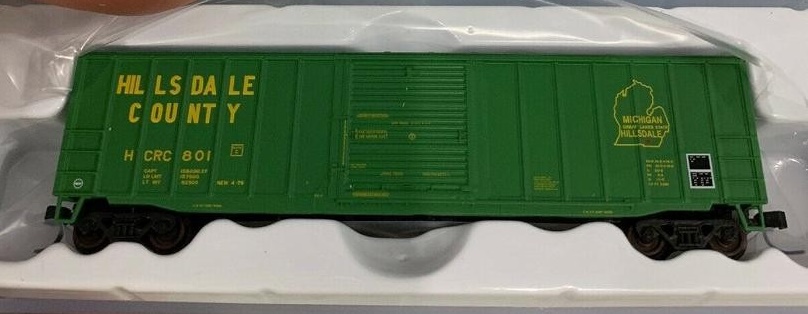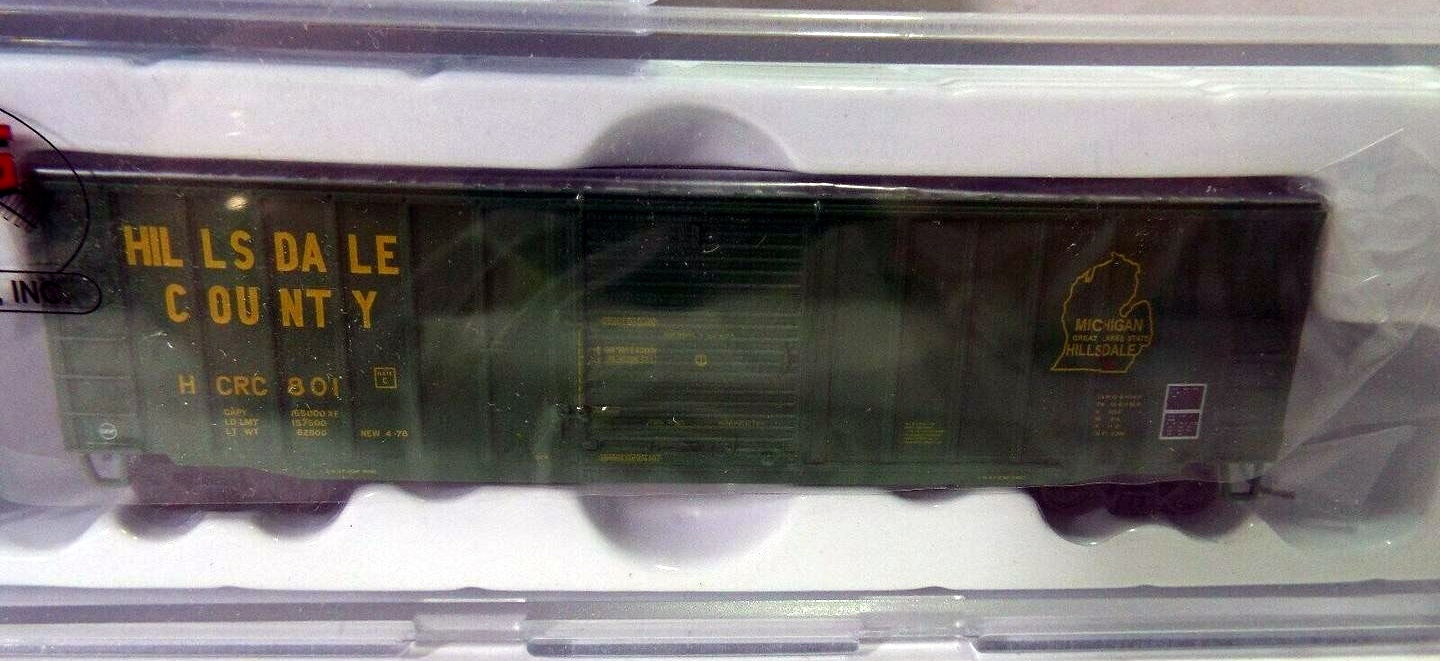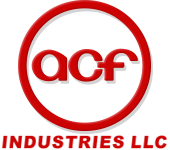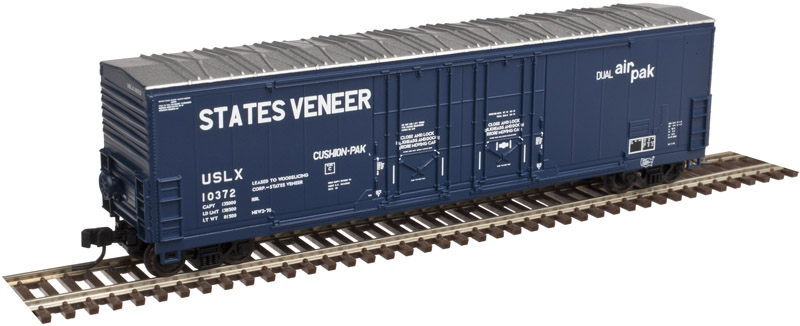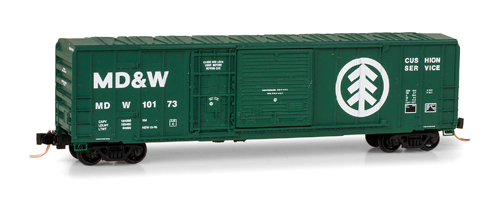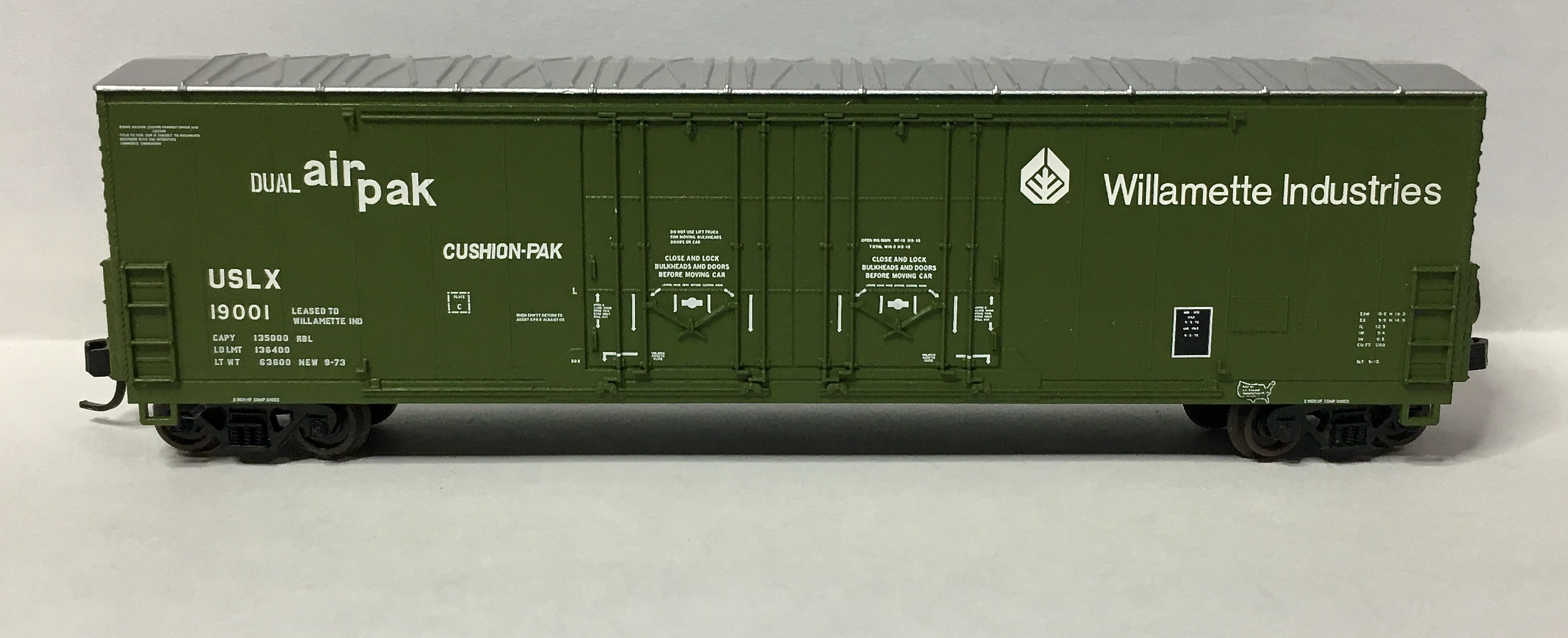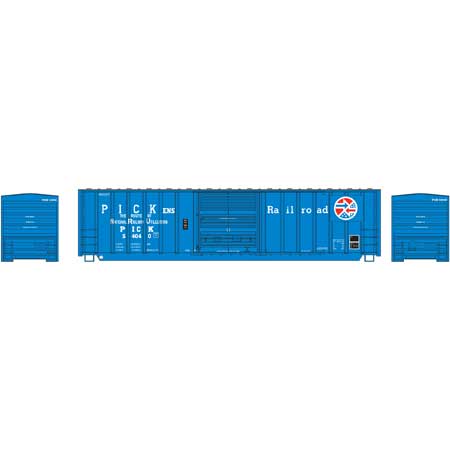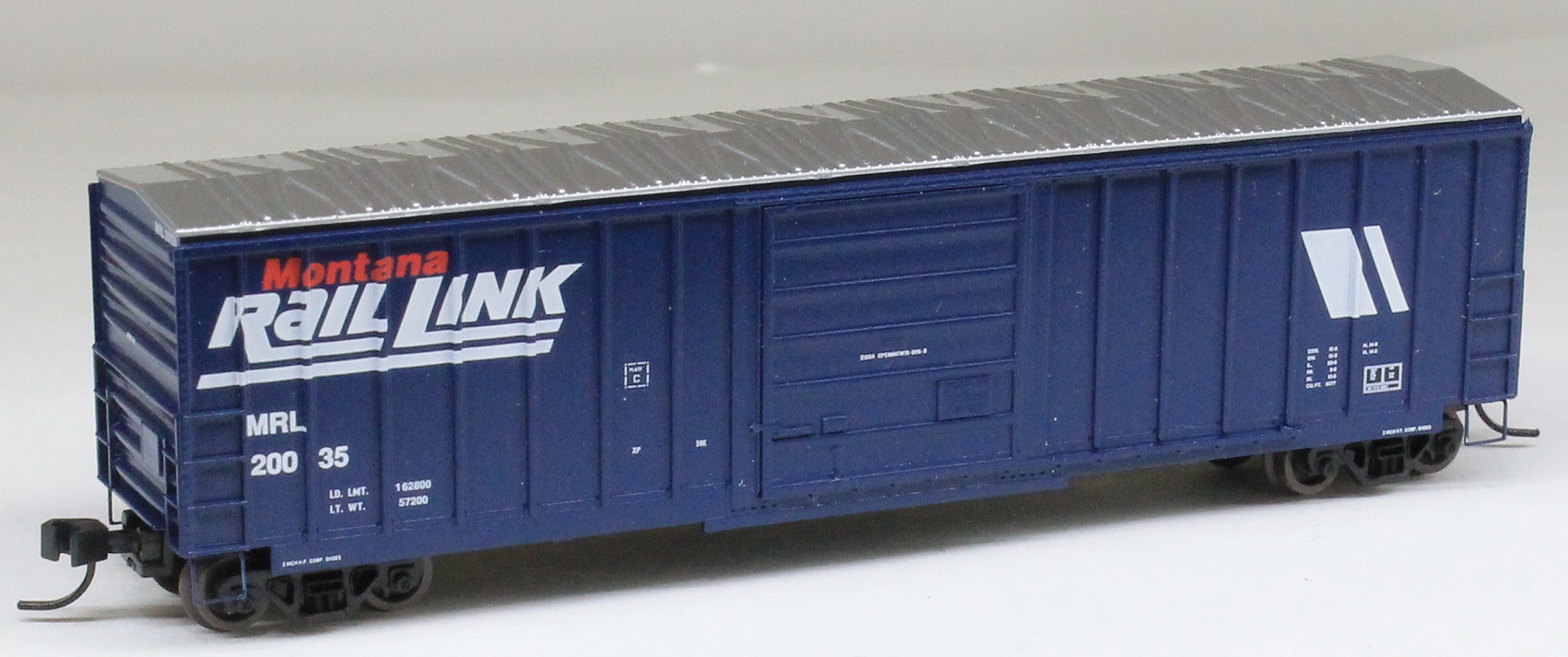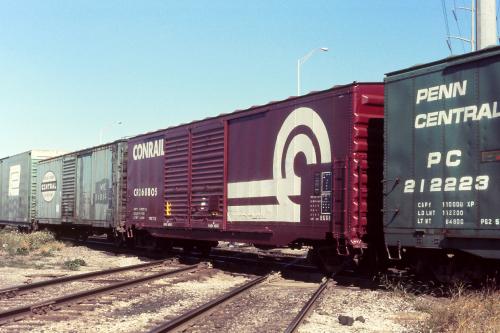Model Information: First released in 2007 in the Atlas Trainman range.
These models feature:
These models feature:
- prototypical non-terminating corrugated ends;
- diagonal paneled roof;
- single 10-foot YSD design sliding door (non-operating);
- detailed cross-member attachment rivets on the side sills;
- weighted, detailed underframes;
- true scale dimensions with accurate details;
- equipped with AccuMate knuckle couplers.
Prototype History: While the 40-foot boxcar was a standard design, and it did come in different setups depending on the type of freight being transported, it was not large enough for efficient mass commodity transportation. The 50-foot boxcar made its first appearance in the 1930s and steadily grew in popularity over the years, which further improved redundancies by allowing for even more space within a given car. Today, the 50-footer remains the common boxcar size. After the second world war ended, and steel became once again readily available, steel became the go-to choice for construction of boxcars. ACF was one of the most prolific builders of these cars.
Road Name History: 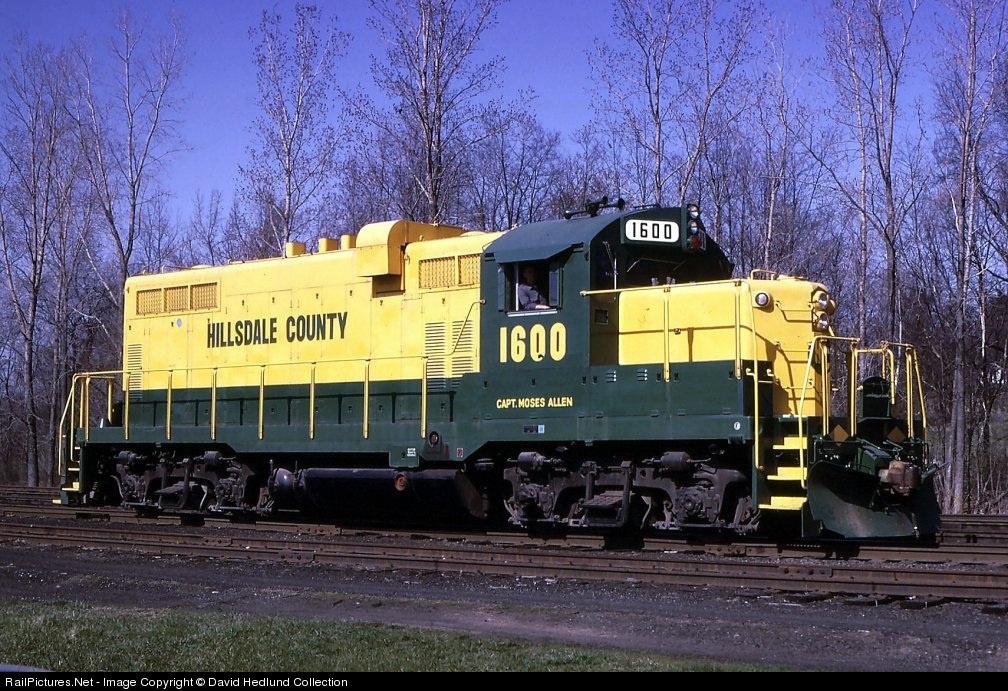 The HCRC ran 95 miles of line in the area where northeast Indiana, northwest Ohio and southeast Michigan meet. Operations began in 1976 on former New York Central routes that were being excluded from the formation of Conral (HCRC and Conrail launched on the same day, April 1.) In 1986, they purchased a former Wabash line in the area from N&W. Six rebuilt geeps worked the line. An NW2 in Bicentennial colors was also on the roster early on. Traffic included coal, fertilizer, flour, food products, grain, plastics, and sugar. Traffic levels were unimpressive and the track began to deteriorate. At the end of 1992, the owner of the Pigeon River Railroad bought the Hillsdale County and merged the two, making the Indiana Northeastern.
The HCRC ran 95 miles of line in the area where northeast Indiana, northwest Ohio and southeast Michigan meet. Operations began in 1976 on former New York Central routes that were being excluded from the formation of Conral (HCRC and Conrail launched on the same day, April 1.) In 1986, they purchased a former Wabash line in the area from N&W. Six rebuilt geeps worked the line. An NW2 in Bicentennial colors was also on the roster early on. Traffic included coal, fertilizer, flour, food products, grain, plastics, and sugar. Traffic levels were unimpressive and the track began to deteriorate. At the end of 1992, the owner of the Pigeon River Railroad bought the Hillsdale County and merged the two, making the Indiana Northeastern.

Brand/Importer Information: In 1924 Stephan Schaffan, Sr. founded the Atlas Tool Company in Newark, New Jersey. In 1933 his son, Stephan Schaffan, Jr., came to work for his father at the age of sixteen. Steve Jr. built model airplanes as a hobby and frequented a local hobby shop. Being an enterprising young man, he would often ask the owner if there was anything he could do to earn some extra spending money. Tired of listening to his requests, the hobby-store owner threw some model railroad track parts his way and said, "Here, see if you can improve on this".
In those days, railroad modelers had to assemble and build everything from scratch. Steve Jr. created a "switch kit" which sold so well, that the entire family worked on them in the basement at night, while doing business as usual in the machine shop during the day.
Subsequently, Steve Jr. engineered the stapling of rail to fiber track, along with inventing the first practical rail joiner and pre-assembled turnouts and flexible track. All of these products, and more, helped to popularize model railroading and assisted in the creation of a mass-market hobby. The budding entrepreneur quickly outgrew the limitations of a basement and small garage operation. Realizing they could actually make a living selling track and related products, Steve and his father had the first factory built in Hillside, New Jersey at 413 Florence Avenue in 1947. On September 30, 1949, the Atlas Tool Company was officially incorporated as a New Jersey company.
In 1985, Steve was honored posthumously for his inventions by the Model Railroad Industry Association and was inducted into the Model Railroad Industry Hall of Fame in Baltimore, Maryland. In addition, Steve was nominated and entered into the National Model Railroad Association Pioneers of Model Railroading in 1995.
In the early 1990s, the Atlas Tool Company changed its name to Atlas Model Railroad Company, Inc.
In those days, railroad modelers had to assemble and build everything from scratch. Steve Jr. created a "switch kit" which sold so well, that the entire family worked on them in the basement at night, while doing business as usual in the machine shop during the day.
Subsequently, Steve Jr. engineered the stapling of rail to fiber track, along with inventing the first practical rail joiner and pre-assembled turnouts and flexible track. All of these products, and more, helped to popularize model railroading and assisted in the creation of a mass-market hobby. The budding entrepreneur quickly outgrew the limitations of a basement and small garage operation. Realizing they could actually make a living selling track and related products, Steve and his father had the first factory built in Hillside, New Jersey at 413 Florence Avenue in 1947. On September 30, 1949, the Atlas Tool Company was officially incorporated as a New Jersey company.
In 1985, Steve was honored posthumously for his inventions by the Model Railroad Industry Association and was inducted into the Model Railroad Industry Hall of Fame in Baltimore, Maryland. In addition, Steve was nominated and entered into the National Model Railroad Association Pioneers of Model Railroading in 1995.
In the early 1990s, the Atlas Tool Company changed its name to Atlas Model Railroad Company, Inc.
Item created by: tombrown on 2021-11-30 18:02:04. Last edited by Alain LM on 2021-12-02 04:50:45
If you see errors or missing data in this entry, please feel free to log in and edit it. Anyone with a Gmail account can log in instantly.
If you see errors or missing data in this entry, please feel free to log in and edit it. Anyone with a Gmail account can log in instantly.


